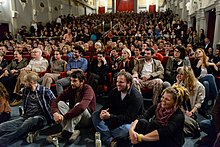Srećko Horvat
Srećko Horvat | |
|---|---|
| File:Srećko Horvat.jpg Srećko Horvat, January, 2014 | |
| Born | 28 February 1983 |
| Era | Contemporary philosophy |
| Region | Western philosophy |
| School | Continental philosophy |
Main interests | |
Srećko Horvat (born 1983) is a philosopher, author and political activist. The German weekly Der Freitag described him as "one of the most exciting voices of his generation" [1] and Hollywood director Oliver Stone called him “a charismatic Croatian philosopher”[2][better source needed] Writings by him have appeared in The Guardian, Al Jazeera, Il Manifesto[citation needed], El Pais[citation needed] and The New York Times .
Life
Horvat was born in Osijek, Croatia, but lived for the first eight years of his life in exile in Germany, before returning to Croatia in 1991.[3] He has published extensively about the Occupy Wall Street Movement;[4] the World Social Forum in Senegal and Tunisia; Participatory Budgeting in Porto Alegre; the Zebaleen in Cairo; Cyprus, China, Lebanon, Israel, and more. He has been involved in setting up the Democracy in Europe Movement 2025 (DiEM 2025) along with Yanis Varoufakis.[5]
Political thought and activity
Horvat is regarded as one of the "central figures of the new left in post-Yugoslavia".[6] He has participated in different activist movements in Croatia. In Germany he published the book After the End of History: From the Arab Spring to the Occupy Movement (Laika Verlag, 2013)[citation needed], where he is engaged in debates and interviews about Occupy Wall Street, Chinese capitalism, poststructuralism and postcolonialism with different thinkers such as Francis Fukuyama, Stéphane Hessel, Terry Eagleton, Gayatri Spivak, etc.[7] In his work with Igor Štiks he has been advocating "direct democracy as a necessary corrective (and possibly a true alternative) to electoral democracy and partitocracy"[8] and, more recently, he is claiming that "it is becoming more and more clear that a movement without a party is impotent, and that a party without a movement can only repeat the failures of the past".[9]

The Subversive Festival
He was one of the founders of the Subversive Festival in 2008[citation needed], a festival which included Oliver Stone, Alexis Tsipras, Aleida Guevara, Slavoj Žižek, Tariq Ali, Zygmunt Bauman, David Harvey, Saskia Sassen, etc. In 2013 together with the programme team he left the Subversive Festival "due to differences in understanding the goals and direction of the activist platforms within Subversive Forum and, more generally, the general purpose of Subversive Festival".[10]
Controversy
During 2013 Horvat was the host and author of an intellectual TV show on Croatian National Television called “Zdravo Društvo” (Sane Society) which tried to recreate the Balkan cultural space and hosted many intellectuals such as Renata Salecl, Rade Šerbedžija, Andrej Nikolaidis, Viktor Ivančić, etc. Officially it was called off by the management because of “austerity measures”. However, commenting the case, the Bosnian writer Miljenko Jergović said “The TV show wouldn’t be removed if there hadn't been for the Guardian piece [11]. If he had written it in 1942 he would end up in Jasenovac concentration camp. If he had written it in 1972 he would end up in Lepoglava prison. But in 2014 he only lost his TV show because he wrote the truth about Croatia”.[12]
Bibliography
In English
• What does Europe want? The Union and its Discontents with Slavoj Žižek, Istros Books, 2013[13]
In French
• "Sauvons-nous de nos sauveurs", Éditions Lignes, 2013
In German
• Nach dem Ende der Geschichte Laika-Verlag, Hamburg, 2013
• Was will Europa? – Rettet uns vor den Rettern (with Slavoj Žižek) Laika-Verlag, Hamburg, 2013
In Croatian
• Što Europa želi? (with Slavoj Žižek), Algoritam, Zagreb, 2013
• Pažnja! Neprijatelj prisluškuje Naklada Ljevak, Zagreb, 2011
• Pravo na pobunu (with Igor Štiks), Fraktura, Zagreb, 2010
• Ljubav za početnike Naklada Ljevak, Zagreb, 2009
• Budućnost je ovdje Svijet distopijskog filma, HFS, Zagreb, 2008
• Totalitarizam danas Antibarbarus, Zagreb, 2008
• Diskurs terorizma AGM, Zagreb, 2008
• Znakovi postmodernog grada Jesenski i Turk, Zagreb, 2007
• Protiv političke korektnosti. Od Kramera do Laibacha, i natrag", Biblioteka XX. Vek, Beograd, 2007.
Articles
- "Godot arrives in Sarajevo", The New York Times, February, 2014
- "It's the Libidinal Economy, stupid!", Al Jazeera, January, 2014
- "Why are the Balkans boiling again?", Al Jazeera, February, 2014
- "First World War: was Gavrilo Princip a terrorist or freedom fighter?", The Guardian, April, 2014
- "Ukraine's fallen statues of Lenin", The Guardian, March, 2014
- "Croatia - a sign of the rotten heart of Europe, The Guardian, December, 2013
- "Croatia - the latest member of the EU periphery", The Guardian, July, 2013
- "Welcome to the Desert of Transition", Monthly Review, March, 2012
References
- ^ Der Freitag, "Occupy ist Lifestyle", 2014 https://www.freitag.de/autoren/der-freitag/occupy-ist-lifestyle
- ^ "Book launch publicity page". Istros Books. Retrieved 22 April 2014.
- ^ Stefan Zweig Zentrum, Salzburg http://www.stadt-salzburg.at/internet/websites/kultur/kultur/kultukontakte/sir/stefan_zweig_forschu_333378/stipendiatinnen_333384/2012_srecko_horvat_370970.htm
- ^ "Okupacija Wall Streeta", Forum, October, 2011 http://www.forum.tm/clanak/okupacija-wall-streeta-78
- ^ acTVism Munich (2016-02-10), Press Conference: Yanis Varoufakis & Democracy in Europe Movement 25, retrieved 2016-02-17
- ^ "Für manche Serben ist Europa eine Bedrohung", Stuttgarter Nachrichten, January 2014 http://m.stuttgarter-nachrichten.de/inhalt.eu-beitritt-fuer-manche-serben-ist-europa-eine-bedrohung.ca9e72c4-d5fb-4ab0-9e62-c3893781146b.html
- ^ "Nach dem Ende der Geschichte", Laika Verlag, 2013 http://www.laika-verlag.de/laika-diskurs/nachdemendedergeschichte
- ^ Srecko Horvat & Igor Stiks, "Welcome to the Desert of Transition", Monthly Review, 2012 https://monthlyreview.org/2012/03/01/welcome-to-the-desert-of-transition
- ^ "President Alexis Tsipras? Is that a joke?", The Guardian, January 2014 http://www.theguardian.com/commentisfree/2014/jan/21/alexis-tsipras-european-commission-president-syriza
- ^ "Open letter to friends of Subversive Festival", 2013 http://www.subversivefestival.com/newsiteml/3/262/en/open-letter-to-friends-of-subversive-festival
- ^ Horvat, Srećko. "Croatia's vote forbidding gay marriage: a sign of the rotten heart of Europe". The Guardian. Retrieved 21 March 2014.
- ^ Miljenko Jergović, "Cinizam Gorana Radmana", Jutarnji list, 2013 http://www.jergovic.com/sumnjivo-lice/cinizam-gorana-radmana-protivan-je-zdravom-drustvu/
- ^ Slavoj Žižek; Srećko Horvat (2013). What Does Europe Want?. Istros Books, London. ISBN 978-1908236166.
